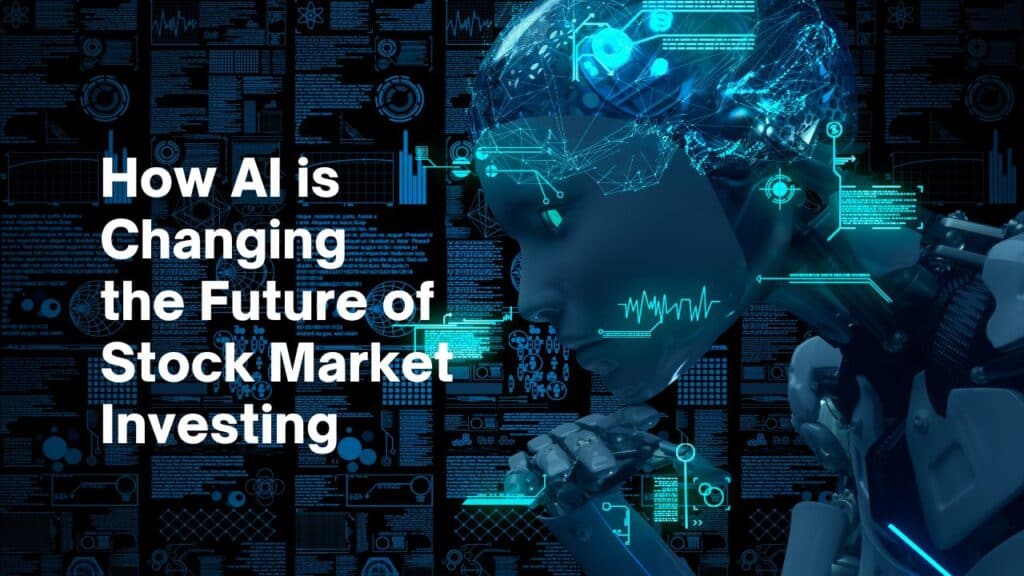How AI is Changing the Future of Stock Market Investing

The stock market has long been a domain where traders and investors rely on data analysis, intuition, and financial expertise to make informed decisions. However, with the advent of Artificial Intelligence (AI), the landscape of stock market investing is undergoing a significant transformation. AI-driven technologies are enhancing decision-making processes, increasing efficiency, and revolutionizing how investors approach trading strategies.
In this blog, we explore how AI is shaping the future of stock market investing, its benefits, potential risks, and what the future holds.
The Role of AI in Stock Market Investing
AI is being used in various ways to improve stock market investments. Here are some key areas where AI is making an impact:
1. Algorithmic Trading
AI-driven algorithmic trading, also known as quantitative trading, uses complex mathematical models to analyze market trends and execute trades at optimal prices. Machine learning algorithms can process vast amounts of data in real time and make split-second trading decisions, giving institutional investors a competitive edge.
Benefits of Algorithmic Trading:
- Speed: AI can execute trades in milliseconds, faster than any human trader.
- Accuracy: Reduces human errors and emotional biases.
- Efficiency: Processes large volumes of data to identify profitable opportunities.
2. AI-Powered Stock Predictions
Predictive analytics in stock investing has improved significantly with AI. Machine learning models analyze historical data, news sentiment, market conditions, and macroeconomic indicators to predict future stock movements.
How AI Improves Stock Predictions:
- Sentiment Analysis: AI can analyze financial news, earnings reports, and social media sentiment to gauge market trends.
- Technical & Fundamental Analysis: AI combines traditional stock analysis with deep learning insights for more accurate predictions.
- Pattern Recognition: Identifies historical market patterns that indicate potential price movements.
3. Portfolio Management and Robo-Advisors
AI-driven robo-advisors are reshaping how individuals invest. These digital platforms use AI algorithms to analyze financial goals, risk tolerance, and market conditions to create and manage investment portfolios.
Advantages of Robo-Advisors:
- Low Cost: Lower fees compared to traditional financial advisors.
- Customization: Personalized portfolio recommendations based on investor preferences.
- Automation: Hands-free investing with periodic rebalancing.
4. Fraud Detection and Risk Management
AI is also crucial in detecting fraudulent activities and managing investment risks. AI algorithms can monitor transactions in real-time, identify anomalies, and flag suspicious activities, reducing the risk of market manipulation and financial fraud.
How AI Enhances Risk Management:
- Anomaly Detection: Identifies unusual trading patterns that may indicate fraud.
- Risk Assessment: AI evaluates the volatility and risk factors of different investments.
- Regulatory Compliance: Ensures that trades comply with financial regulations.
The Challenges and Risks of AI in Stock Market Investing
While AI offers numerous benefits, it also presents certain risks and challenges:
- Over-Reliance on AI: Investors may become too dependent on AI models, leading to vulnerabilities if the models fail.
- Market Volatility: AI-driven high-frequency trading can contribute to market fluctuations and flash crashes.
- Data Privacy Concerns: The use of vast amounts of financial data raises privacy and security concerns.
- Ethical Considerations: AI-driven trading strategies may create an unfair advantage, raising ethical and regulatory questions.
The Future of AI in Stock Market Investing
As AI technology continues to evolve, its role in stock market investing will only grow. Here are some potential future developments:
- Advanced Deep Learning Models: More sophisticated AI models will enhance market predictions.
- Integration with Blockchain: AI and blockchain technology could improve transparency and security in financial transactions.
- Wider Adoption by Retail Investors: More individual investors will gain access to AI-powered tools previously available only to institutions.
- Improved Regulatory Frameworks: Governments will establish regulations to ensure ethical AI trading practices.
AI is revolutionizing stock market investing by making it more efficient, accurate, and accessible. From algorithmic trading to predictive analytics, AI-powered innovations are helping investors make data-driven decisions and maximize returns. However, as AI becomes more deeply integrated into financial markets, investors must remain aware of the associated risks and ensure responsible use of these technologies.
The future of stock market investing is undoubtedly AI-driven, and those who adapt to these advancements will have a significant advantage in navigating the complexities of the financial markets.








Interesting 🤔